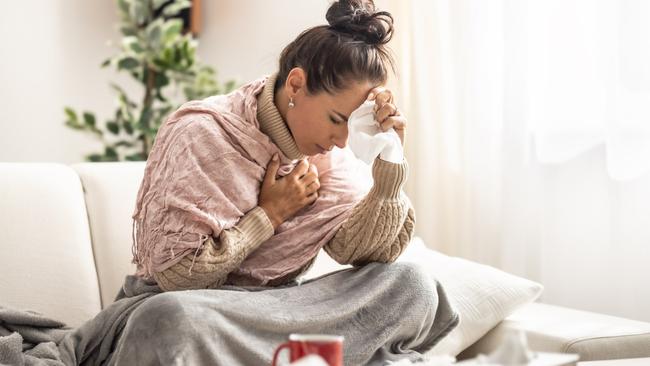'60,000 cases': Why experts are worried about this year's flu season
It’s been a sickly start to the year

Lifestyle
Don't miss out on the headlines from Lifestyle. Followed categories will be added to My News.
There have been tens of thousands of reported flu cases in Australia before we’ve even reached flu season. Experts say now is the best time to get vaccinated.
Despite many workplaces offering them for free, and doctors, pharmacies, immunisation centres and Aboriginal Medical Services making them extremely accessible, vaccination rates in Australia are steadily declining.
We haven’t even reached flu season yet, and there have already been over 63,000 flu cases reported this year, with 48,000 occurring in the first quarter alone.
The country is on course to have an above-average amount of cases this year, already outnumbering 2024’s 30,494 infections and the 18,582 of the year before.

It looks like the height of the Covid pandemic is fading from many of our memories, as we’re paying less attention to the vaccines we’re up to date with at the same time as more of our coworkers are choosing to come into the office sick.
President of the Royal Australian College of General Practitioners (RACGP), Dr Michael Wright said, “earlier this year, we called for action following more than 46,000 lab-confirmed flu cases, a 50% spike compared to the same period last year. We’re also seeing an alarming fall in vaccination rates nationwide compared to previous years, as well as for other respiratory diseases including COVID-19 and whooping cough. I urge all Australians to keep in mind that the flu can not only land you in hospital, but take your life, and it must be taken seriously."
Immunity is strongest in the first three months post-vaccination, and flu season often peaks in August.
Who can get free flu vaccines?
The government’s immunisation program ensures those at greater risk of severe flu infections can get vaccinated for free, including:

- People aged over 65
- Pregnant people
- Aboriginal and Torres Strait Islander people
- Children aged six months and older with certain medical conditions
- All children aged between six months and 5 years old
How serious is the flu?
While many young, healthy people assume the flu is just a slightly worse version of the common cold, it isn’t.

Even if you’re in peak health, both influenza A and B can seriously knock you around, causing coughing, sneezing, a sore throat and fevers.
The virus is also linked to heart attacks and strokes, and can cause bronchitis and encephalitis in rare cases.
As per SBS, president of the Royal Australian College of General Practitioners (RACGP), Dr Michael Wright said, "more than 1000 deaths last year involved the flu, a 67.3 per cent increase on 2023, while more than 4200 people were admitted to hospital".

Pregnant, elderly, young, chronically ill, immunocompromised, Aboriginal and Torres Strait Islander people, and smokers are more at risk of experiencing more severe symptoms and complications of the flu.
Children under five are also more likely to be severely affected by the flu and require hospital treatment.
Can you get the flu from the vaccine?
Flu vaccines don’t contain the live virus, so you can’t get influenza from the injection.
They work by prompting your immune system to protect you from the flu.

There are some possible side effects, though the Department of Health and Aged Care notes that ‘less than 1 in 6 people experience side effects from the flu vaccine. These can feel similar to early signs of influenza and may include fever, tiredness and muscle aches. These side effects usually last a couple of days, and you will recover without any problems.’
Can you catch the flu even if you’re vaccinated?
You can still get the flu if you’re vaccinated, but the University of Queensland’s Professor Paul Griffin told SBS, "what we know is that no matter what happens when you get the flu after you're vaccinated, it's going to help at least a little bit in terms of reducing the severity, perhaps duration, and perhaps the ability to pass it on. There's a whole host of benefits."
And if you’re still not worried about the flu affecting you, it’s a good idea to get vaccinated to at least limit your chance of giving someone else the flu.
More Coverage
Originally published as '60,000 cases': Why experts are worried about this year's flu season





